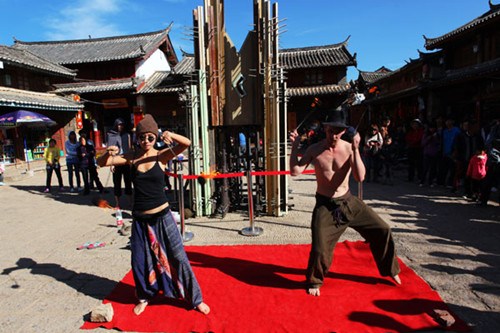
Huayin villagers perform traditional Naxi songs and dances at the Co-Art Festival in Shuhe Old Town in Yunnan province's Lijiang. PHOTO BY HU YUANJUN / FOR CHINA DAILY

The Co-Art Festival draws both local and foreign artists. PHOTO BY HU YUANJUN / FOR CHINA DAILY
In 2008, he found He Jixiang and a dozen other elders in the village, who could remember pieces of those songs. One old man knew the ancient songs but had become too old to sing them. He died two years ago.
"There's an enthusiasm or at least a lack of shyness when they're singing at home," He Liyuan says of the Naxi. "Here, these performances are genuine and real, and filled with emotion."
He Xiangyang, 38, one of He Jixiang's sons, started learning those songs and dances from his father at age 25.
He is also studying at a Dongba school, which was founded by the local government in 1993 to preserve the Dongba culture. He has studied the community's history and traditions, including the ancient language, folk stories and drawings. He has already finished three years of study and will graduate in two years.
"We Naxi have the tradition of singing and dancing. We sing about everything — farming, births, deaths and love," he says.
He Xiangyang is also teaching his 8-year-old son He Ping to study the Dongba culture and ancient songs.
Huayin village has 77 families with 286 people, 99 percent of whom are ethnic Naxis. The average annual household income is 10,000 yuan ($1,600) and is earned by growing potatoes and colza.
He Liyuan realizes that trying to popularize Naxi music is a daunting task: Most young people would rather play mahjong than listen to folk music. Many are going out to work in big cities, and some never return. "They give up the tradition quite easily," he says.
Every Saturday, He Liyuan gathers the old people of the village to rehearse and study together in an abandoned school. He Jixiang teaches the songs word-by-word and explains the meaning of each sentence.
The troupe has performed at various galas in Lijiang city since 2008.
He Liyuan says that because those old people have spent their whole lives in the village, he has to teach them how to use the toilet and how to sing in front of microphone when they go to the city.
But no compromise to modernization is needed for the music. "The old men and I don't want to disturb the originality of the music. Just a campfire and an outdoor space would be enough for them, and any decorative or experimental plots are no good to them," He Liyuan says.
He says that they will try their best to keep these music and tradition alive, but a valuable part of the centuries-old tradition will inevitably be lost.
"Those old people in the troupe are keepers of the oral tradition, along with their own history," He Liyuan says. "It's all in their own heads."

Copyright ©1999-2011 Chinanews.com. All rights reserved.
Reproduction in whole or in part without permission is prohibited.